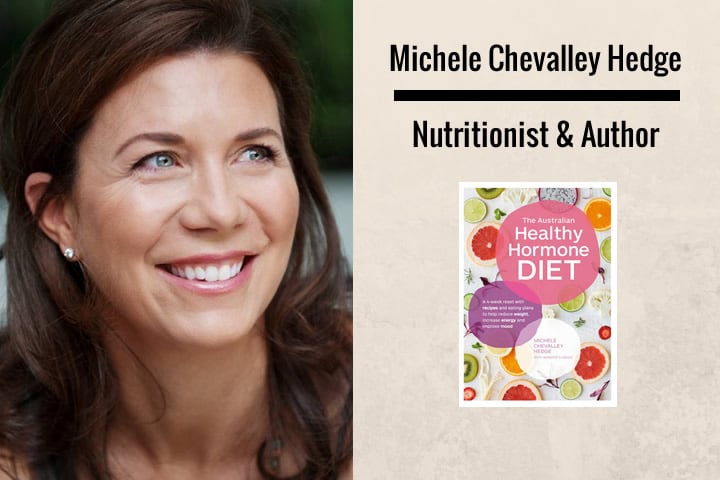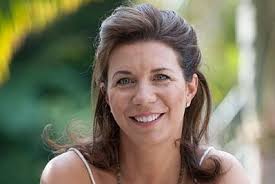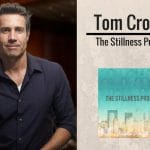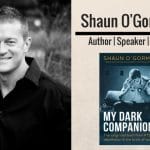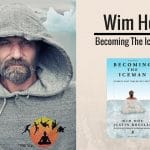Watch the full interview below or listen to the full episode on your iPhone HERE.
Stu: This week we welcome back Michele Chevalley Hedge to the show. Michele is a Nutritional Medicine Practitioner, (Adv. Dip of Nutritional Medicine, Australia Traditional Medicine Society) and the author of many health related articles. She also has proven strategies to incorporate good nutrition into a fast paced family, as the mother of three teenage children and her own busy practice. She can empathise with all types! A Healthy View recently has expanded Sydney operations to open in New York, with its new online family wellness program Low Sugar Lifestyle.
Audio Version

- What are the tell-tale signs of hormone imbalance?
- In terms of nutrition, what foods most negatively impact our hormones?
- How long does it typically take to start seeing (and feeling) positive results?
Get More of Michele Chevalley Hedge
If you enjoyed this, then we think you’ll enjoy this interview:
Full Transcript
Stu
00:03 Hey, this is Stu from 180 Nutrition, and welcome to another episode of The Health Sessions. It’s here that we connect with the world’s best experts in health, wellness, and human performance, in an attempt to cut through the confusion around what it actually takes to achieve a long lasting health. Now I’m sure that’s something that we all strive to have. I certainly do. 00:23 Before we get into the show today, you might not know that we make products too. That’s right. We’re into whole food nutrition, and have a range of superfoods and natural supplements to help support your day. If you are curious, want to find out more, just jump over to our website. That is 180nutrition.com.au and take a look. Okay, back to the show. 00:44 This week, I’m excited to welcome Michele Chevalley Hedge. Michele is a highly commended nutritionist, health writer and presenter who is often introduced as the modern day nutritionist, the one who likes a bit of wine and coffee. Love it. Her latest book, The Healthy Hormone Diet, offers a four week reset to help reduce weight, increase energy, and improve mood, which is what we’re gonna talk about today. 01:07 Now, I really love Michele’s approach to health and nutrition, and I know you’ll enjoy this interview as much as I did. Over to Michele. 01:19 Hey guys. This is Stu from 180 Nutrition, and I’m delighted to welcome Michele Chevalley Hedge back to the show. Good afternoon Michele. How are you?
Michele
01:27 Hi Stu. Thanks for having me on.
Stu
01:29 No problems. Look, before we jump into all of the good bits about the show today, I would love it if you could just tell our listeners a little bit about who you are and what you do.
Michele
01:40 Okay, sure. My name is Michele Chevalley Hedge. I’m a qualified nutritionist, and I’m the founder of A Healthy View. And I chose that name for my business because as a nutritionist I believe in a healthy view, and not an extreme one. I’m often introduced as the modern day nutritionist, the one who likes a little bit of a cheeky pinot, and a little bit of coffee, which I first, Stu, you know, when I was first introduced like that-
Stu
01:40 Yeah.
Michele
02:08 I was like, “Oh.” And then I was like, “Michele, own that space.”
Stu
02:12 Yeah.
Michele
02:12 Because I do believe, I truly believe that sure, of course there’s a time and a place for an extreme approach.
Stu
02:17 Yes.
Michele
02:18 But most people need to enter this space gently and easily.
Stu
02:22 Yeah.
Michele
02:23 With an abundance of good food so that they don’t feel like they’re being pared back and stripped back. So what else can I tell you? I have three children. I have a dumb dog. I have a busy husband, lots of loads of laundry, like every other person listening to this podcast. I’m the author of two international health books, one of which we’ll talk a lot about today. And I do lots of corporate and school speaking across Australia and the States.
Stu
02:56 Fantastic. Boy oh boy, you are, you make me tired just listening to everything that you are doing and have achieved as well. So thank you so much for your time. We’re gonna be talking a little bit about your new book, The Healthy Hormone Diet, today as well. But before we get into that, I wanted to ask you a little bit about hormones. And I took a flight to Sidney last week, end of last week, and in the in-flight magazine, there was a whole page on hormones. “Do you think that you have a hormone problem? Because if you suffer from any of these symptoms, it might be a problem for you.” And there was a page long of symptoms that was skin, and dirt, and weight issues, and sleep issues, fatigue issues, digestive issues, all of the above. And I thought, that could be anything. So from your experience, what are the telltale signs of hormone imbalance, maybe the most common signs?
Michele
04:02 Okay. So I’m so glad that you started with that, Stu, because when I was writing this book, and the reason I wrote it was because I’m the author of Beating Sugar Addictions for Dummies. So sugar was a big thing.
Stu
04:17 Yeah.
Michele
04:18 Gut health was a big thing, and still is, and rightly so. The next big thing in the area of wellness and well-being will be hormones. And in fact, when my book was being written and published, and it came out in February, we were thinking there was going to be a lot more books on the market around hormones. But there will be over the next 12 to 18 months.
Stu
04:40 Yeah.
Michele
04:41 So here’s the thing, Stu. So you know I run a clinical practice where we see patients, hundreds of patients every week. So we’ve got several different practices. We’re seeing people at the call face. We’re not celebrity nutritionists. We’re just us.
Stu
04:56 Yeah.
Michele
04:56 Face to face with people. So it didn’t matter, people would be coming in for all sorts of reasons, Crohn’s Disease, cardiovascular disease, autoimmune, whatever they were coming in with. But the common threads were weight, energy, mood swings, and stress. Those were the common things.
Stu
04:56 Right.
Michele
05:52 And all of a sudden, the hormone goes out, and boom, all of the, the belly fat comes. The betty back fat comes. So what I like to do in the book is break down eight different case studies, eight real people, who have been my patients forever, that have gone on TV and radio with me. And you can’t fake authentic, right, when people are telling their stories.
Stu
06:16 Yeah.
Michele
06:46 Right? So that may not have been their typical background and their history, but they’ve gotten to that age, and they’ve been sleep deprived and they’ve been stress head. And all of a sudden, boom, they look at their blood pathology, and they go, “Well wait a minute. I’m pre-diabetic? How could this be? I’m a slim person.” So we package it up nicely into eight different case studies, so people can go, “Wow. That’s me,” or, “That’s my partner,” or, “That’s my mother.” And then we round out the book with 28 days of abundant eating. 07:23 So let’s just take hormone right there. So let’s just go on to saying, “Okay, so Michele, what about all these other things that this in-flight Qantas magazine talked about?” So there’s lots of people that are waking up after eight hours of sleeping, and still feeling exhausted. They go to bed tired but wired-
Stu
07:23 Yes.
Michele
07:44 Because their cortisol is completely out. And that can be driven from lots of things. But it could also be driven from food. So they go to bed tired but wired. They wake up, let’s say if they’re lucky, they get eight hours sleep, and they’re exhausted. They come to our clinical practice, and we start to talk to them. We say, “Let’s take a deeper look at your thyroid, because one out of four women in Australia are suffering from some kind of sub-clinical thyroid condition. It could be Hashimoto’s. It could be Grave’s Disease. It could by hypo-thyroidism or hyperthyroidism. But it just could be a sluggish thyroid from lack of iodine, lack of selenium, too much gluten irritating the thyroid. We know that people who are suffering thyroid conditions, Stu, they do not feel vitality, energy, a happy libido. They feel like they’re swimming through mud every single day. And often, and this is no discredit to a GP. And often a GP will just look at their TSH and go, “Oh, your TSH is fine,” and they won’t have looked beneath that nutritional surface that we would look at it with. 09:05 So in the book, we have a perfect example of this woman, Lucia, two young children, high powered, on-the-go, busy woman. And she has, she gets a thyroid blow out, and she just feels like she is treading water, and in brain fog, and low libido every day. And it’s like, she actually thinks she has anxiety, depression, or a mood disorder, when it’s just thyroid.
Stu
09:34 Yes.
Michele
09:34 So my book talks about cortisol hormone-
Stu
09:39 Yeah.
Michele
09:39 Which is your stress hormone, which is your fat storage hormone, serotonin hormone, which is your happy hormone, and 80 to 95% of our happy hormone is being created in our gut. So does it not make sense that if our gut is being fed really well, with a whole food diet full of fiber, full of antioxidants, full of beautiful rich foods, that we minimize the risk factors of anxiety, depression, and mood disorders? Well, anxiety, depression, mood disorders, multi-factorial. Big topic’s mental health, right?
Stu
10:23 Yes.
Michele
10:24 But if we can help one percent with our fork, because we’re allowing a space for the serotonin to be created and not dampened, and not fueled by a candida fire or a IBS like symptoms, we’re winning with our fork. How amazing is that?
Stu
10:45 So I wanted to ask you, where was your book two years ago, when I had issues like this? Because I wanna tell you a very brief story of … I was experimenting with a new form of exercise, and pushed myself to extremes day after day after day. And at the very same time, thought that it might be interesting to see what happens if I pulled back on my carbohydrates and went very low carbohydrate. And my adrenals crashed. So my cortisol level at 10 p.m. was 10 times higher than it should’ve been. And the curve was all over the place. And my naturopath phones me up and said, “Look, we really need to sort this out, because this is life threatening. This stuff is so serious. You have to get on top of that.” And as a consequence, my sleep suffered. I was waking up, just like you say, in the morning, after nine hours sleep, super groggy, no energy. I was craving sugary foods. I had leaky gut, and because I was stressed, and tired, and wired, and all of these things. So it’s really good to hear that this book isn’t just for the females out there is it? It’s for males too, right?
Michele
12:04 Absolutely. In fact, there’s eight case studies, and two of them are men. And they’re men just like you, my husband, and everybody’s reading the book is gonna go, “This is my husband.”
Stu
12:17 Yeah.
Michele
12:17 So you know, when we say the word hormones, people automatically think, “Oh perimenopause and menopause.”
Stu
12:24 Yeah.
Michele
2:24 But no. This is about all of those hormones. And Stu, I can’t stress enough the importance of that adrenal fatigue-
Stu
12:33 Yes.
Michele
12:33 And sometimes, there’s a time and a place, Stu, for people dropping all their carbs.
Stu
12:40 Yeah.
Michele
12:42 In certain situations. But for the most part, those types of some carbs really fuel those adrenal glands, and allow those adrenal glands to be really well nourished. What we’re actually seeing is people that go, ” No carb, no carb, no carb,” riding on their adrenals so badly that it’s often affecting their thyroid. And the very reason people go low carb, they end up having a rebound effect and getting a sluggish thyroid, and end up looking at a crumb, or a piece of rice, and gaining weight.
Stu
13:21 Right. Wow. So in terms of nutrition, what are the most common everyday foods then do you think that most negatively impact our hormones?
Michele
13:34 I think the reality is if, I think hidden sugars.
Stu
13:38 Yep.
Michele
3:39 So I think when we move to a whole food, unpackaged and unprocessed way of life, this is ideal. Now, Stu, you know me. I live in the real world with everybody else that’s listening.
Stu
13:54 Yeah.
Michele
13:54 So I don’t always eat real, whole food. Sometimes I’m eating packaged and processed. But when I do, I’m making a very, very conscious choice. I’m looking at the sugar. I’m looking at if I can read the ingredients, if I can pronounce the ingredients. So I’m looking at those things. 14:14 In my book, The Healthy Hormone Diet, it comes with a 28 day plan of lots of recipes, delicious recipe.
Stu
14:22 Right.
Michele
14:22 And so in that 28 days, I try to say to people, this isn’t a plan forever. This is a time and a place to give your body a reboot, but not detoxing, not stripping back. Give yourself such a reboot with real, whole, clean foods, so that when you come off of it, you go, “Oh nice. I’m in a clean slate.” So you start to enter things back in. When you enter that Muesli bar back in, that is packaged, how did it feel?
Stu
14:56 Yeah.
Michele
14:57 Was it okay for you? When you enter a piece of bread back in that’s packaged, how was it, ’cause you’ve been on a clean slate for 28 days. So a lot of people will go, “Wow. You know what, Michele, you make this so easy that I can actually move to a whole real food way of life for let’s say Monday through Thursday. And then Friday, Saturday, Sunday, I’ll be a bit of a weekend warrior.” But I love the fact that we have packaged this book up so nicely that people can eat really clean for 28 days.
Stu
15:36 And in terms of, you mentioned at the start there were eight case studies in there as well, and I’m guessing these guys are going to have gone through a huge success. Are there any particular ones perhaps that stand out that you wanna share, just to get us, move us into this book?
Michele
15:55 Yeah, definitely. I will share David with you, ’cause I think it’s a surprise that a lot of people just go, “Oh wow. David.” 54 year old business executive, flying around the world. And his wife says to him, “David, you don’t need a midlife crisis. You need a midlife change.”
Stu
16:15 Yeah.
Michele
16:15 “So I want you to do this 28 day hormone rebalance.
Stu
16:19 Yeah.
Michele
16:19 And he’s very skeptical. You know, he’s a typical Aussie male, like my husband, really, really lovely, but sort of a little bit of a doubter. But he goes and gets his blood pathology. And on his blood pathology, his fasting hormone and his fasting glucose looks metabolically like he’s the age of a 65 year old.
Stu
16:41 Wow.
Michele
16:42 He started, so of course, when that starts to go out, that’s where they, the belly fat, the abdominal fat starts to come.
Stu
16:42 Yes.
Michele
16:50 And also, some of the visceral fat, which is the scary fat, like around our organs that you have to worry about. That’s a cardiovascular risk factor. So the doctor looks at his blood pathology. “Gee David, I think you’re gonna be heading for blood pressure medication. We’re gonna head for Metformin, for a bit of hormone.”
Stu
17:10 Yeah.
Michele
17:11 “We’re gonna head for some cholesterol medication.” So his wife says, “No, no, no, no. David, we’re gonna give this a go with this nutritionist, Michele Chevalley Hedge,” and blah, blah, blah. So when you read the story, if I had my glasses on and the book in front of me, I would read you that typical case study. But basically, he does it. And he’s like, “Michele, this is easy.” He said, “You shared with us a couple of principles,” which is food combining principles, which I’ll talk to you about in a moment. He said, “But you filled my life with so much food and so tasty and so easy, that I’m not thinking about the junk food of the past.” He said, “And I’m actually not hungry.” He said, “I’ve never lost so much weight, gained so much clarity, and eaten so much food. This is crazy.” So he talks about this in the book. 18:02 And so after the four weeks, he had amazing results. I forget how much weight he lost in the first four weeks, but it was very significant. Let’s say it was eight kilos. So he said, “Michele, I’m just gonna continue this,” he said, “‘Cause this is easy.” And he said, “I wanna go back to the doctor in three months time and redo my blood pathology, and then say to him, ‘Let’s make some decisions on my medication.'” 18:25 So he goes back to his doctor. The doctor goes, “Wow. David, look at you. You’re looking like [inaudible 00:18:33].” So he does his blood pathology, calls David back to the office, and he says, “David.” He said, “I really need to know who this nutritionist is that you’re working with.” He said, “I have not seen such changes on a blood pathology as I’ve seen like this.” He said, “You don’t need any medication, David. You need to just stick to what you’re doing.” 18:56 So I had said to him, “David,” when I first met his, jokingly, and said, “David, I’m gonna make you a lean, mean, fighting machine.”
Stu
19:04 Yeah.
Michele
19:04 Because I knew his wife, and I could joke with him that way. And he said, “Michele, when I came to you,” he said, “It looked like, on blood tests, that I needed my heart to be saved.” And he said, “From the bottom of my heart,” he said, “I actually think you’ve saved my heart.”
Stu
19:23 Wow. Fantastic.
Michele
19:25 Yeah. Yeah. So awesome, Stu.
Stu
19:27 Unbelievable.
Michele
19:27 And I still see him. I see all of our patients.
Stu
19:31 Yeah.
Michele
19:31 Intermittently over the years. And the thing is, Stu, I think as a practitioner, if you can make it easy, you can make it tasty-
Stu
19:43 Yeah.
Michele
19:43 … you can make it affordable.
Stu
19:44 Yes.
Michele
19:45 Then all of a sudden, it becomes repeatable.
Stu
19:48 Yeah.
Michele
19:48 Right? And then all of a sudden, people go, “Wait a minute. I’m not really doing any diet. I’m just doing something that’s become a habit. And it becomes lifestyle.
Stu
20:00 Absolutely. I think if you can program that into our habits, make it habitual every single day, then we’re on auto-pilot. But we’ve shifted the autopilot from the bad stuff to the good stuff.
Michele
20:14 Absolutely.
Stu
20:14 Which is so great. You mentioned food pairing, which got me intrigued. I wondered if you could tell us a little bit more about that.
Michele
20:20 Yeah. It always really intrigues people, because years ago, there was sort of this fad going on about food combining. So as you know, Stu, I’m very much an evidence based practitioner.
Stu
20:33 Yeah.
Michele
20:34 I’m so keen on evidence that actually, part of my book is on, part of the proceeds are donated to Deacon University. Deacon University has a research center called the Food and Mood Center. And people can’t believe, even Pam McMillan was like, “Wow. Michele, you’re gonna donate the proceeds of your book to the Food and Mood Center?” And I said yes, because I am so deeply passionate about evidence based medicine. Because that gives me the ability to appear on TV, stage, to you-
Stu
20:34 Yeah.
Michele
21:10 With okay, here is the gold standard trial. So I love that. But here’s the thing about one of the things that I talk about in my book for the 28 days, is I use food combining. Whilst there’s no evidence based research coming out of university on this, for 10 years in clinical practice, Stu, it hasn’t let us down. So here we go. Very simply. Food combining. We don’t do this all the time, but during the 28 days, we did.
Stu
21:42 Yeah.
Michele
21:43 If we take a protein, and we combine it with a vegetable. It keeps our digestion light. If we take a grain like quinoa, brown rice, buckwheat, and we combine it with vegetables, it keeps our digestions light, okay. But if we take a protein and a grain, they are two long burners, right? They go into our tummy. Our tummy goes, “Hey, this is cool. I’m not gonna be hungry for a little while. I’m gonna keep Stu satiated.” So thinking like, “Oh, I’ve got some really nice eggs in my tummy.”
Stu
22:25 Yeah.
Michele
22:25 You don’t feel hungry really quickly. Or for lunch, I had, oh brown rice and a lot of vegetables. You feel satiated. It’s a long burner. It’s not a fast burner, right?
Stu
22:37 Right. Yep.
Michele
22:38 Okay. So if I take protein, let’s say fish, and I take some brown rice. Sometimes the combination of the two, Stu, can weigh people down a little bit. And what I wanna do over the 28 days is lighten people’s digestions, so that they have energy for things, so they can see how, what is bogging them down? What is weighing them down? It’s not that having a protein and a grain is a bad thing. Just during the 28 days, I want people to go, “Wow. I feel satiated. I feel really full. I feel like that was a delicious meal. And wait a minute, who’d this me at four o’clock in the afternoon, beetling around the office with this newfound energy. And wow, this is kind of a new like feeling for me. I lo it. 23:35 So in reality, Stu, I could’ve called this book The Clean Slate Diet.
Stu
23:40 Yeah.
Michele
23:41 It’s really about people eating really well in sort of a different format over 28 days, for them to get themselves to a clean slate, to go, “Hmm. I now see what’s working for me, and what wasn’t working for me.
Stu
24:01 Got it. Got it. And what is your take on fats in the book as well? Would we use those to support hormones?
Michele
24:09 Oh absolutely, absolutely. So you know, always talking about adding fats into-
Stu
24:14 Yeah.
Michele
24:15 … each of our meals.
Stu
24:15 Right.
Michele
24:16 So what I think a lot of people don’t realize is that fat is really, really important in turning on the hormone leptin.
Stu
24:25 Yes.
Michele
24:26 And Leptin is the hormone that goes, “Hey brain, you feel satiated. You feel full.” And also what people don’t realize is our brains are made up of 60 to 75% fat. So people that are struggling with something in the cognitive or neurological area, like ADHD, Alzheimer’s, Parkinson’s, Autism. Anything in that spectrum, that, their brain loves fat.
Stu
24:56 Yeah.
Michele
24:57 Loves fat.
Stu
24:57 Yeah.
Michele
24:58 So I’m a big fan of fat. Yeah.
Stu
25:00 Fantastic. And wanna dial back a little bit to sleep, because I know that sleep can be the catalyst to screw everything up. And if you get a bad night’s sleep, you’re more hormone resistant, you make poor choices during the day. You feel so groggy and just out of shape. What suggestions could you offer perhaps late at night, in the pantry, that might be able to help us with our sleep a little?
Michele
25:32 Fabulous question, Stu. So whenever I’m speaking, at a speaking engagement, I will always say this. Sleep, exercise, nutrition. It’s a three prong approach. And if you look at the healthiest people you know. And please, everybody who’s listening, start observing this.
Stu
25:50 Yeah.
Michele
25:50 They guard those three things with their life.
Stu
25:54 Yes.
Michele
25:54 They do not compromise. They do not say to the person who’s their partner, heir family, or their coworkers, ” I’m sorry. I’m slipping away early. I need my sleep.” They just do it.
Stu
25:54 Yeah.
Michele
26:05 They do not say, “I’m sorry. I’m going to exercise right now.” They just do it.
Stu
26:05 Yeah.
Michele
26:10 They do not tell people what they’re eating and why they’re eating it. They just do it, because they know fundamentally, sleep, exercise, and nutrition, od what makes you energized, productive-
Stu
26:24 Yes.
Michele
26:24 All those things that we need. 26:26 So here’s the thing about sleep that people don’t know. Sometimes, having hidden sugars in their diet, will make somebody tired but wired, right?
Stu
26:38 Yeah. Okay.
Michele
26:39 But also, not having protein punctuated in each of their meals is an important factor, I think, of good quality sleep.
Stu
26:39 Okay.
Michele
26:52 Because protein breaks down to an amino acid called tryptophan. Tryptophan is the precursor to melatonin.
Stu
27:00 Yeah.
Michele
27:01 Our sleep hormone.
Stu
27:02 Right.
Michele
27:03 So when we see people having sleep issues, we look for one, hidden sugars, and two, we look at the importance of protein. Sometimes, we even give somebody a beautiful protein shake with 180 Nutrition packed in it-
Stu
27:20 Oh, fantastic.
Michele
27:21 … before bed, because it gives them that protein. So we look at stabilizing their protein before they go to bed, and ensuring that. So that’s a really big concept that people underestimate, is just through our foods, that we can get that from the tryptophan to the melatonin. 27:42 The other thing that I highly recommend people to stop doing, which people often will laugh about. But you’ll get this. I like people to stop having an abundance of water and tea and liquids at night.
Stu
27:58 Yes.
Michele
27:58 Because what I don’t want happened it somebody to wake up at 12 o’clock in the morning, have to go to the bathroom, and then become monkey chatter, monkey chatter, monkey chatter. I want you to have, I want you to be very hydrated throughout the day. I don’t want you to confuse your hunger for thirst during the day. But I want you to kind of dial back on it at night, so that you don’t wake up and all of a sudden, the stress head turns on.
Stu
28:27 Yeah. That’s a really good point. And I make a conscious effort to pretty much try and knock any on the head by 7:00 p.m, because I just don’t wanna wake up during the night. I just don’t.
Michele
28:27 Yep.
Stu
28:41 And it works, and it works, too.
Michele
28:43 It so does, Stu. And when I say this to people, they’ll kind of think about it. You’ll see them processing it. And then I’ll get an email like a week later, a month later, something will come up on Facebook or Instagram, and say, “Michele, one tiny little tip that you told me, and I am sleeping so much better.”
Stu
29:02 Yeah. Fantastic. That’s great. And in terms of supplementing, any staple herbs or supplements that will be necessary in the early stages to support your hormones?
Michele
29:17 Do you know, Stu, of course there are lots of supplements that I’m well across, and well versed, and well versed with the evidence based research around hat.
Stu
29:29 Yeah.
Michele
29:29 You can do a rebalance, or a cleanse, or a healthy hormone diet without the use of any supplements at all.
Stu
29:37 Yeah.
Michele
29:38 And I, when we first looked at working with patients, we say, we don’t really recommend supplements so we get to have a better look at people. But with that said, Stu, most people, and I just say most, generalized, could benefit from some added fish oils.
Stu
29:59 Right.
Michele
30:00 Because most of us don’t have enough fish in our lives or enough fats in our lives. And we know that fat is great at hormone balancing, brain function, anti-aging, everything. In terms of probiotics, I used to take a probiotic every day. Now I say to people, “Why not eat it?” Have a look at some Kim Chi, a bit of sauerkraut. So I always like people to get al of their nutrients through food rather than a supplement. But there is a time and a place for a supplement, particularly if you are vegan and vegetarian.
Stu
30:42 Yep.
Michele
30:43 So this year, Stu, I’m gonna do a Ted talk, and my Ted talk is called, Mental Health Hijackers That Could BE Lurking In Your Food. And one of the things I talk about is being a vegan and a vegetarian. And I do not discriminate against being a vegan or a vegetarian, or being gluten free or being dairy free. All of these things have its time and its place. But what I say about vegans and vegetarians that the whole entire world needs to know, is that they will often lack iron, ferritin, and they will often lack B12, both of which are imperative for our mental health, both of which have very big connections to our serotonin and our dopamine pathways. 31:33 Now this doesn’t mean, again, I’m discriminating. What it means is for those people to be watching their food sources and making sure they’re eating iron rich foods or B12, having a blood test every 12 to 18 months, and if necessary, supplementing with a good quality supplement.
Stu
31:53 Yeah. No, that’s great advice. I gave a health talk a couple of weeks ago. And one of the members of the audience put their hand up and said, “Look, what do you think about vegan vegetarian diets?” And much like you, I said, “Yes. They can be wonderful for some people. But A, you have to know where you are before you start on that journey in terms of your health, blood levels, hormones, all of thee above. And more than likely, you’re gonna have to be, you will have to be smart with supplementation, because it’s very tricky to keep on top of all of the nutrients that you need to thrive. So yeah.
Michele
32:30 It really is, Stu, and you know I’m deeply passionate about children, of course. We all should be.
Stu
32:38 Yes.
Michele
32:39 And when I’m speaking in schools, particularly to young women, where the statistics of a mental health disorder, anxiety, depression, and mood disorder, is one out of four.
Stu
32:50 Yeah.
Michele
32:51 Between the ages of 16 and 24. Now we know, mental health, or that issue, is not just with the one person. It spans to the family, the friends, the community, the school, right? So it affects everyone. And a lot of these girls, young girls, are dabbling in that space. So I think it’s an important message to say, “There’s no discrimination here. There’s no judgment coming from me or my colleagues. It’s just about being aware.” Stu: 33:21 Yeah, no, that’s good advice. I have, I’ve got three young daughters myself. So the eldest will be 13 next week, and I’ve got twins at 10 now as well. And I’m very aware that it’s very easy to charge them up before they go to school with a breakfast that has so much sugar, and jus sets them on edge for the entire day. So I think very important to think about how we can nourish our children before we even, before they even leave the house in the morning. And like you say, if you have stable energy, then I think your mood and your mindset is gonna be far easier to control over the course of the day, especially when these guys are at the mercy of their hormones at that age as well. 34:05 Oh absolutely. There’s so much going on for them as teenagers. I mean, who would want to go back to that space where your confidence and al of those things, right? There’s so much going on. But-
Stu
34:05 Yeah.
Michele
34:16 If we can be nourishing them before they’re off to school, and if we can be leading by example.
Stu
34:24 Yeah.
Michele
34:25 I think that’s one of the most important things. So a lot of your listeners right now would be going, I always say this. I say, “When was the last time that you really nourished yourself?” And this is no disrespect to men, but women are very, very good at nourishing everyone in their life, their children, their partners, their parents, their community, their dogs, right? But they’re not very good at nourishing themselves.
Stu
34:53 Yes.
Michele
34:53 On all levels.
Stu
34:55 Yes.
Michele
34:56 And sometimes, when I say, “When was the last time you nourished yourself?” Some people will start to get teary. And I say, “This is not a luxury. This is a necessity.”
Stu
35:06 Yeah.
Michele
35:07 Because when you start to feel good about yourself mentally and physically, and then your emotional health starts to shine, boy, you are all of a sudden the butterfly effect to your family and your community. You can give tenfold what you could’ve done without looking after yourself, right?
Stu
35:27 Absolutely right. So a couple of tips then to nourish ourselves, perhaps tips that would make the biggest impact on our overall health and wellbeing.
Michele
35:39 Well, taking a little bit, taking it a little bit back to The Healthy Hormone Diet, is get your blood sugar right, because people don’t realize once they get their blood sugar right and their hormone’s stabilized by eating three meals a day, wow. There’s a lot of clarity that comes with that. There’s a lot of energy that comes with that. So I think that’s very important that people think about eating three meals a day. Now, they don’t have to be packing every meal out with a lot of carbs. I always say to people, think about some carbs at breakfast. Think about your carbs at lunch. If you wanna pare back on your carbs at dinner, and you’re somebody who’s over 30, that can make sense, because you don’t necessarily need all that energy on board at night. But I say to people, ” Don’t underestimate fuel, the right fuel onboard.” We go and spend a lot of money on counselors, personal trainers, good hair, good skin. But we underestimate that food can underpin all of those things.
Stu
35:39 Yes.
Michele
36:48 And we have to eat three times a day. So why not eat real food? And when you’re eating real, whole food, unpackaged and non-processed, it’s not packed with hidden sugars. And that’s where people gain weight.
Stu
37:02 Yeah.
Michele
37:02 Not with real, whole food. So the first, my first message is eat three times a day.
Stu
37:08 Okay.
Michele
37:09 My second message is eat whole food as often as possible.
Stu
37:14 Right.
Michele
37:15 Again, I don’t live in the … I live in the real world. Sometimes I pick up packaged food. But when I do, I’m making a conscious decision on, “Am I gonna, do I need that? Or can I really wait another half an hour so I get a handful of almonds and a couple of apples?” Don’t beat yourself up. If you do, pick up some grab and go. 37:37 And that’s my third point, Stu. This is a really big point. For anybody who’s pursuing a place of wellness and moving to a cleaner food lifestyle, there’s gonna be days where you have pizza and a bottle or wine, or half a bottle of wine. There’s gonna be days like that. And when you do, do it, enjoy it. Don’t beat yourself up. And just get back on track the next meal
Stu
38:10 Yeah.
Michele
38:10 Too many people spend too much time beating themselves up. They gotta let go of that.
Stu
38:17 Totally. That’s great advice. And we always say, by all means, don’t beat yourself up. One hamburger, one pizza is not gonna make you fat. And just as well, just in the same vein, one salad is not gonna make you slim overnight. We it’s the sum of all of the things put together. If you get 80% of it right, then you can get away with 20%. You can enjoy the 20%, because I think you’ll be on the right track.
Michele
38:47 Absolutely. Absolutely. I agree with that. I agree 110% with that. That is absolutely my philosophy.
Stu
38:55 Fantastic. So The Healthy Hormone Diet, where can we go to get it?
Michele
39:01 So, you can go to, plug, #plug. You can go to our website-
Stu
39:09 Yes.
Michele
39:09 A Healthy View, and you can buy it online. It will be delivered to your home.
Stu
39:13 Fantastic.
Michele
39:13 You can go to your local Demmick’s. Someone from Queensland sent me a message yesterday and said they bought it at Target. So most good booksellers will have it. Or you can buy it online through Booktopia.
Stu
39:26 Fantastic. Well look, we will put all the links in the show notes as well, and just guide as many people as we can over there. It sounds fantastic. I’ve got a copy on the way, so I’m very much looking forward to getting that. Shame I couldn’t have had that two years ago. I think that would’ve been a great help to me.
Michele
39:42 Yeah.
Stu
39:44 So just before we wrap up the show, what’s next? What have you got in the pipeline?
Michele
39:50 Oh, so exciting. The next couple of days. I feel little tickle in my throat because I’ve been speaking so much.
Stu
39:55 Yeah.
Michele
39:56 I am on a book tour right now around Australia, which is wonderful. But I’m also speaking at Positive Schools Across Australia. It’s a conference about 4,000 educators. And gee, is that an honor and a privilege to be able to talk about, to them, about nourishing them-
Stu
39:56 Yeah.
Michele
40:16 … so they can nourish our children. Wow. Like really, whew, so good. And then I’m going to the States and launching my book there. And all really, really good things, and just getting the message out there, Stu. And as you know, I am deeply full of gratitude to be a nutritionist. So I’ll leave you all with this, which I leave everybody with. Reach out to me. Instagram, Facebook, personal emails, whatever. We have a big team of people. But don’t ever say, “Hey Michele, hate to bother you,” because I always tell everybody this. You are not a bother. You are so my purpose.
Stu
40:53 Fantastic.
Michele
40:53 Thank you.
Stu
40:54 That’s awesome. And for all of those people that do wanna hit you up, Michele Chevalley Hedge. Google Michele Chevalley Hedge, A Healthy View. Which would be the best place to send them?
Michele
41:05 A Healthy View.
Stu
41:06 Fantastic. Okay. Look, thank you again for your time. You are supremely knowledgeable, and very, very … It’s just great to catch up with you again, like fantastic.
Michele
41:06 Thanks Stu.
Stu
41:17 Really appreciate it. Hopefully we will catch up in the future, and I hope the book tour goes well.
Michele
41:22 Great. Thanks, Stu. Thank you very much. Bye.
Stu
41:24 We’ll speak to you soon. Thank you. Bye-bye.


